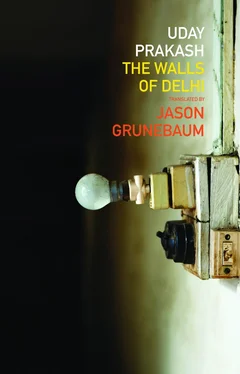By then, Suri was more than a year old, and his head had grown to a substantial size. It was true that his neck was stronger than before, and he could now use it to lift up his head. Either it would wobble for a bit before plopping back down, or he would slide on his knees and try to crawl. But pretty soon he tired and began fighting for breath. Whatever energy he had left over was spent trying to catch his breath, and he soon grew listless and collapsed in a heap wherever he happened to be.
But Chandrakant and Shobha had also recently begun to sense that it wasn’t just his head that was growing, but that his mind, too, was developing more quickly than babies the same age.
Every day he seemed less and less like a baby.
Then I wasn’t able to see Chandrakant for a few months. He did call once, and was at his wit’s end. The doctors had more or less made their pronouncement. According to them, Suri would live at most one-and-a-half or two years. His disease was incurable. Of course, if they had two, two-and-a-half million rupees, something might be done. But to say that this was a sum beyond Shobha and Chandrakant’s wildest dreams would be a gross understatement.
According to him, the doctors said that Suryakant was an abnormal baby and that the cells in his head were reproducing more quickly than the rest of his body, and that this was due to some unknown reason: a neurological disorder was possible, viral or bio-genetic factors could not be ruled out, a poisonous effect of strong environmental pollution could have played a part. Whatever the cause, if this disproportionate development wasn’t stopped, in two-and-a-half-years max, Suri would surely meet his end.
But more than one year has already passed! Only six months left…?
I felt deep sympathy for Shobha and Chandrakant. They’d had a child together on the cusp of old age. But the child had a head like a time bomb sitting atop its own body. Tick, tick, tick, stuck in a countdown that would end its life with an explosion, always busy with plotting not its own life, but its death.
I couldn’t bear looking at Suryakant. He began to recognise me, and when I arrived he smiled and tried to crawl over. I wondered how they did it, spending every second of the day with him. How they managed putting him to bed and waking him up, knowing that each new day brought his life one day closer to the end. What went through Shobha’s mind when she breastfed him? Was the milk nourishing his life or was it fueling the flames of his impending death?
Shobha often wondered if the problem might lie with her, and she cast doubts on herself. Thirty years ago, she was gang-raped by the contractor, inspector, and Ramakant, her betrothed, as the men drank and drank, ate and ate, and watched porn. Her rectum had been shredded by the bottle inserted while on their savage spree. Maybe this had caused permanent strictures in her uterus? Could this be the cause of the seven deaths of her seven children? She couldn’t talk openly with Chandrakant about these suspicions. It was only after her third child had died that she asked a nurse whether something in her womb might be spoiled?
The nurse looked Panjabi. She was plump, middle-aged, and clearly had an eye for making money. She gave Shobha a sharp look.
‘I’m guessing you had an abortion before you got married? How many? You had your fun in bed. But now the bed’s been made. You’ll have to lie in it! Get an ultrasound done of your empty womb. Come see me tomorrow, I’ll get it done for you. It’ll cost seven fifty. Don’t tell your husband. Otherwise forget it.’
But in those days Shobha had no way to scrape together seven hundred and fifty rupees. A LIVING PUPPET OF STONE, STEEL, CLOTH, AND MUD
She breastfed little Suri. She tickled his chin and his underarms — coochie coochie coo! She clapped her hands merrily and snapped her fingers, and made little bird whistles or cat sounds. But Suri remained unmoved and showed almost no signs of life. She felt that death’s shadow was gaining ground on the two of them, creeping up step by step. She saw in her mind’s eye little Suri wheezing in her lap uncontrollably, then seizing up, going cold, his oversized head plopping down on her lap, lifeless.
She had a dream one night that while trying to lift Suri’s head, it suddenly slipped from her hands, fell on the floor, and burst open. But instead of blood emptying from the head was every colour imaginable, flooding the floor and soaking the carpet — the one that was no ordinary rug, but the one they had called a magic carpet for thirty years, where she and Chandrakant had played their hot, primal games.
The still puzzling thing was that unlike other babies, Suri didn’t cry at all. When he was hungry or needed something, he crawled over to Shobha. Whenever he fell down or got hurt, instead of bursting into tears he closed his eyes and pursed his lips as the pain disappeared inside. Then he touched the place on his body where he had been hurt, and then the thing he had bumped into. And once he got hurt and absorbed the shock, he wouldn’t make the same mistake again. He learned from his experiences very quickly — so quickly that Shobha and Chandrakant couldn’t believe it. It wasn’t just the size of his head that kept getting bigger, but his brain was growing at a rate much faster than babies his age. It looked as if he was constantly thinking, absorbed in his silence, alone inside a secret darkness.
Suri not only didn’t cry anymore, but he also stopped laughing. His expressionless face was like a marionette made of wood, cloth, stone, rusty iron. A weak, misshapen animated little puppet. It had to be a something out of the ordinary to make him laugh. Like one day when Shobha was looking for the knife to cut the veggies. Just a little while before she had taken the knife and placed it in the thali with the potatoes. But now the knife was no longer there; she searched high and low. Suri was in the corner, sitting up against the wall, silently observing her. Shobha, giving up finding the knife anywhere nearby, stood still. When she saw the knife along with a half-peeled potato hidden right where Suri was sitting, he was instantly filled with glee. At first she wasn’t sure what to think, but then joined him in laughter.
One morning he crawled out onto the balcony and stared for a long time out at the houses around and the street below, all the while steadying his heavy head on his shoulders. It was exactly the time when all the kids were on their way to school, and the old folks were out buying bread and milk. Eighteen-month-old Suri seemed to be watching the hustle and bustle with great focus. A schoolboy of eight or nine came running carrying his knapsack, waiting on the side of the road for his school bus. He suddenly remembered something and ran off back where he had come from; the hustle and bustle of the street continued in the five or so minutes the boy was gone. Then the boy appeared again carrying a kids’ water thermos. Suri thought this was hysterical. The boy looked up to see Suri laughing, and realised he was laughing at him because he knew he had forgotten his water bottle at home. The boy looked over to Shobha and shouted, ‘Hey auntie! Your little boy is sooo cute. What’s his name?’
‘Suri!’ she replied, smiling.
‘Suri,’ he repeated, waving and smiling as he walked toward the boy. But he stopped short when he saw the huge misshapen head. Shobha looked and saw Suri barely managing to wave with one hand, his face twitching, losing strength as he struggled. His lips formed the faint outline of a smile, but it was the strange expression of someone losing control.
Shobha was sure that Suri listened attentively whenever she and Chandrakant talked to each other. He stared at them, never blinking, as if he could understand each and every word.
Читать дальше










